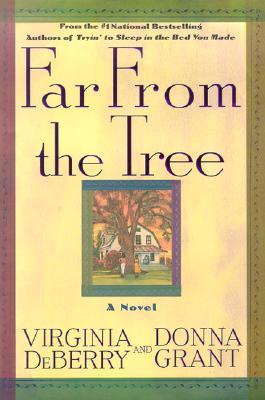Book Review: Far From The Tree
Published: Sep 01, 2000
Reviewed by:
Paige TurnerA prominent novelist once declared, "You can’t go home again", but co authors Virginia DeBerry and Donna Grant have reevaluated this truism to be more in line with the "feeling, healing" new millennium. In their new novel, Far From the Tree, this dynamic duo display the writing strength and extraordinary insight into human nature that made their debut book, Trying to Sleep in the Bed You Made, so impressive.
The title, Far From the Tree, invites readers to seek similarities among the women of the Frazier family. These contentious females are full of barbed remarks and sharp retorts for each other. Father Will Frazier’s loving presence smoothes everything over and creates the sense of family, (both while he is living, and after he has passed on), but the women in the family are still stubborn, prickly and headstrong. "Celeste wasn’t the easiest person to get along with’Della had seen her child more upset about picking up the wrong brand of detergent than she appeared to be about the demise of her marriage, but there wasn’t anything more to say about it. Della knew Celeste was as stubborn as they come, and she was likely to cut her tongue out before she admitted there was something wrong with her marriage."
Mother Della holds a terrible secret that she wants desperately to suppress. Oldest daughter Celeste’s rigidity and need for control lead to the downfall of her perfect marriage. Younger sister Ronnie’s live-for-the-moment mentality leaves her virtually living on the street, hanging on to the fringes of a once promising entertainment career. "Ronnie had rebounded. Her life was still hung together with chewing gum, paper clips and spit, but at least this felt normal. On the bus to work she had gone over next week’s casting calls in Back Stage and Show Business and circled the ones that seemed right. It would only be a week till the check cleared. The beauty shop. Rent. A new head shot and mailing. A little shopping. She had things to look forward to."
Upon their father’s death, Buffalo, New York natives Ronnie and Celeste Frazier inherit their family’s long abandoned homestead in Prosper, North Carolina. This event changes their lives in ways they never could have imagined. Once again De Berry and Grant display an uncommon insight into the ups and downs of friendships, family, male-female relationships, human behavior toward others, and how hurts, grudges and disappointments are nursed.
A central question floats all through Far From the Tree: Can you ever really keep a lid on your secrets? The authors seem to say that our secrets aren’t really secrets, but common knowledge. The very mental act of defining a secret shifts all normal behaviors, and puts the secret holder into a mode that sticks out like a drunk in the church choir. Others can see and smell our secrets all over us. The characters in Far From the Tree live out this lesson, right before readers’ sympathetic eyes. After an unexpected illness Ronnie confesses her hand-to-mouth lifestyle to Della: "But you don’t understand." Ronnie swallowed hard. "Ma—I—I can’t pay for this—for anything—"’ "I know." "How? How did you’" "I been guessing you had your struggles for years’That’s plain foolishness, Ronnie. Pride is one thing, actin’ stupid is another."
DeBerry and Grant know how real, flawed people think and act, and they support their characters with uncommonly excellent interior thinking and dialogue. Far From the Tree also presents an excellent roller coaster plot with big time heartbreak. The authors also do a good job of communicating African Americans’ hopes for upward mobility, along with the bitter underside of these often-dashed dreams. Far From the Tree also addresses the broken promises of black Southerners’ migrations to the "Promised Land" of the North. DeBerry and Grant write knowingly about Buffalo (a city with many similarities to Cleveland), and about the southern town of Prosper, NC.
Far From the Tree has a universal appeal that will be as attractive to white readers as it will to African Americans. Each character has a distinct personality and voice. The plot is well crafted and everything is in this book for a reason, everything fits together. Nothing is left dangling. The resolutions make sense.
Far From the Tree possesses all of the qualities that make for satisfying reading: a believable diverting plot, realistic dialogue, good pacing, nice presentation, characters that are engaging and identifiable but flawed, and people facing problems in their relationships. Far From the Tree has no major faults and has everything to recommend it. Books like this are why readers read novels.
The best aspect to Far From the is that it lets readers’ imaginations do much of the work, by presenting the dots but not connecting them. Will Ronnie and her new beau get together? Will Celeste and her husband divorce remain married? Can Della reconnect with her old flame? Read Far From the Tree to find out and enjoy yourself immensely while doing so.

